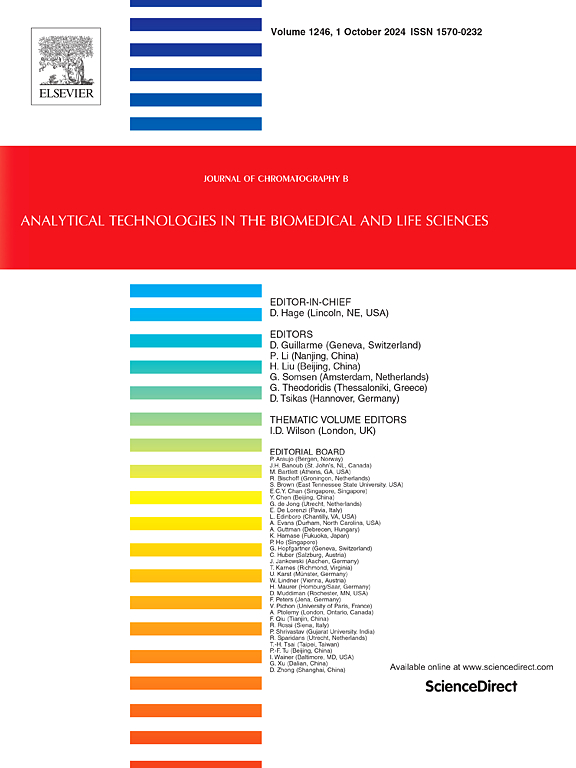Liquid chromatography in determination of pharmacokinetic properties of compounds in drug discovery process
IF 2.8
3区 医学
Q2 BIOCHEMICAL RESEARCH METHODS
引用次数: 0
Abstract
Liquid chromatography plays a pivotal role in the determination of pharmacokinetic properties during drug discovery, particularly through the evaluation of lipophilicity. This parameter is essential in drug development, significantly influencing pharmacokinetic and pharmacodynamic behavior of potential drugs. It affects membrane permeability, solubility, distribution, and interaction with biological targets, making it a central focus in the early stages of drug design. Poor lipophilicity-related characteristics are often associated with drug failures, inefficacy, toxicity, and increased development costs. Experimental and computational methods, such as chromatographic techniques and theoretical calculations, are vital for accurately determining lipophilicity. These approaches enable the simulation of biological processes, providing insights into how lipophilicity impacts ADME (absorption, distribution, metabolism, and excretion) properties and supporting the optimization of drug candidates. In silico tools further enhance the efficiency of ADME evaluations, reducing the risk of pharmacokinetic-related failures and streamlining the drug discovery process.
液相色谱法测定药物发现过程中化合物的药动学性质
在药物发现过程中,液相色谱法在确定药代动力学特性方面起着关键作用,特别是通过评估亲脂性。该参数在药物开发中至关重要,对潜在药物的药代动力学和药效学行为有重要影响。它影响膜的渗透性、溶解度、分布和与生物靶点的相互作用,使其成为药物设计早期阶段的中心焦点。亲脂性差的相关特征通常与药物失败、无效、毒性和开发成本增加有关。实验和计算方法,如色谱技术和理论计算,对于准确测定亲脂性至关重要。这些方法能够模拟生物过程,深入了解亲脂性如何影响ADME(吸收、分布、代谢和排泄)特性,并支持候选药物的优化。计算机工具进一步提高了ADME评估的效率,降低了药代动力学相关失败的风险,简化了药物发现过程。
本文章由计算机程序翻译,如有差异,请以英文原文为准。
求助全文
约1分钟内获得全文
求助全文
来源期刊

Journal of Chromatography B
医学-分析化学
CiteScore
5.60
自引率
3.30%
发文量
306
审稿时长
44 days
期刊介绍:
The Journal of Chromatography B publishes papers on developments in separation science relevant to biology and biomedical research including both fundamental advances and applications. Analytical techniques which may be considered include the various facets of chromatography, electrophoresis and related methods, affinity and immunoaffinity-based methodologies, hyphenated and other multi-dimensional techniques, and microanalytical approaches. The journal also considers articles reporting developments in sample preparation, detection techniques including mass spectrometry, and data handling and analysis.
Developments related to preparative separations for the isolation and purification of components of biological systems may be published, including chromatographic and electrophoretic methods, affinity separations, field flow fractionation and other preparative approaches.
Applications to the analysis of biological systems and samples will be considered when the analytical science contains a significant element of novelty, e.g. a new approach to the separation of a compound, novel combination of analytical techniques, or significantly improved analytical performance.
 求助内容:
求助内容: 应助结果提醒方式:
应助结果提醒方式:


